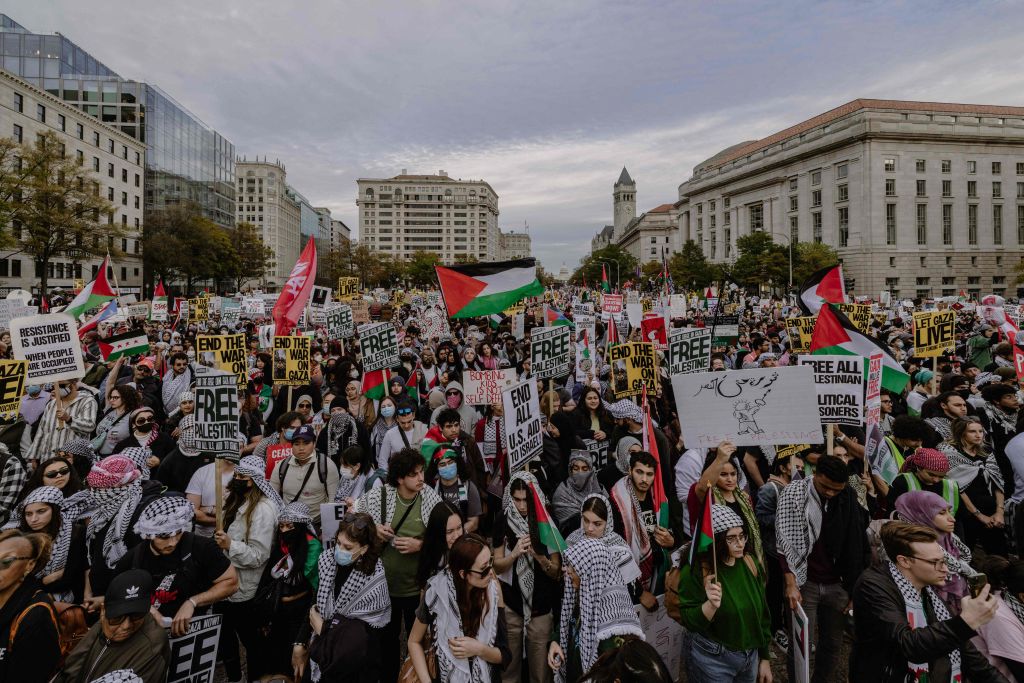

Source: ALI KHALIGH / Getty
The conflict between Israel and Palestine has been one of the deadliest battles in world history. It has already claimed countless lives and displaced millions of families. The wild part is that its origin dates back to more than a century ago. Check out answers to your frequently asked questions inside.
Israel declared war on the Gaza Strip after an unprecedented attack by the armed Palestinian group known as Hamas on Oct. 7. Since then, the world has been tuned into what may come next and why certain countries (cough, cough America) have been involved.
It is reported that Hamas killed over 800 Israelis in assaults throughout southern Israel during the attack last month. While Israel has launched a bombing campaign in the Gaza Strip, killing thousands of Palestinians. Casualties are expected to arise on both sides of the war, which Gaza’s Health Ministry reported has already killed at least 10,022 Palestinians. Some 1,400 Israelis have died, mostly civilians killed in the Oct. 7 incursion by Hamas that started the conflict.
The issue that concerns citizens round the world is how Israel has mobilized its troops along the Gaza border, allegedly preparing for a ground attack. It announced a “total blockade” of the Gaza Strip last month, stopping the supply of food, fuel and other essential commodities to the already besieged enclave in an act that under international law amounts to a war crime.
Here’s a simple guide to break down one of the world’s longest-running conflicts:
The Land Known As Israel Before 1948
Of course, it began with the Brits. Britain seized the land known as Palestine, following the defeat of the Ottoman Empire, which ruled that part of the Middle East, in World War One.
The land was inhabited by a Jewish minority and Arab majority, as well as other, smaller ethnic groups.
Tensions between the two peoples grew when the international community gave the UK the task of establishing a “national home” in Palestine for Jewish people.
This stemmed from the Balfour Declaration of 1917, which was a pledge made by then Foreign Secretary Arthur Balfour to Britain’s Jewish community. The declaration was enshrined in the British mandate over Palestine and endorsed by the newly-created League of Nations – precursor of the United Nations – in 1922.
To Jews, Palestine was their ancestral home, but Palestinian Arabs also believed the land was theirs and refused the move.
Between the 1920s and 1940s, the number of Jews arriving there grew, with many fleeing from persecution in Europe, especially the Nazi Holocaust in World War Two.
Violence between Jews and Arabs, and against British rule, also increased.
In 1947, the UN voted for Palestine to be split into separate Jewish and Arab states, with Jerusalem becoming an international city. That plan was accepted by Jewish leaders but rejected by the Arab side and never implemented.
Israel’s Creation
In 1948, Britain withdrew and Jewish leaders declared the creation of the State of Israel. It was intended to be a safe haven for Jews fleeing persecution, as well as a national homeland for Jews. Fighting between Jewish and Arab militias had been intensifying for months, and the day after Israel declared statehood, five Arab countries attacked.
Hundreds of thousands of Palestinians fled or were forced out of their homes in what they call Al Nakba, or the “Catastrophe.” By the time the fighting ended in a ceasefire the following year, Israel controlled most of the territory.
Jordan occupied land which became known as the West Bank, and Egypt occupied Gaza. Jerusalem was divided between Israeli forces in the West, and Jordanian forces in the East.
More wars and fighting continued in the following decades, because there was never a peace agreement in place.
The Gaza Strip
Gaza is a narrow strip of land sandwiched between Israel and the Mediterranean Sea, but with a short southern border with Egypt. Just 41km (25 miles) long and 10km wide, it has more than two million inhabitants and is one of the most densely populated places on Earth. In the wake of the 1948-1949 war, Gaza was occupied by Egypt for 19 years. Israel occupied Gaza in the 1967 war and stayed until 2005, during that time building Jewish settlements.
Israel withdrew its troops and settlers in 2005, though it retained control over its airspace, shared border and shoreline. The UN still considers the territory to be occupied by Israel.
It’s a strip of land that’s caused such hateful and violent turmoil.
The Problem
There are countless issues the countries refuse to settle.
Issues include:
- What should happen to Palestinian refugees?
- Whether Jewish settlements in the occupied West Bank should stay or be removed
- Whether the two sides should share Jerusalem
- And – perhaps most tricky of all – whether a Palestinian state should be created alongside Israel
Some Efforts Made To Resolve
Israel-Palestinian peace talks were held on and off between the 1990s and 2010s, interspersed with outbreaks of violence.
A series of secret talks in Norway became the Oslo peace process, forever symbolized by a ceremony on the White House lawn in 1993 presided over by President Bill Clinton.
In a historic moment, the Palestinians recognized the State of Israel and Israel recognized its historical enemy, the Palestine Liberation Organization (PLO), as the sole representative of the Palestinian people. A self-governing Palestinian Authority was set up.
Cracks in the peace treaty revealed itself when opposition leader Benjamin Netanyahu called Oslo a mortal threat to Israel. The Israelis accelerated their project to settle Jews in the occupied Palestinian territories. The recently emerged Palestinian militant group Hamas sent suicide bombers to kill people in Israel and wreck the chances of a deal.
The atmosphere in Israel turned ugly, culminating in Israeli Prime Minister Yitzhak Rabin’s assassination by a Jewish extremist on 4 November 1995.
In the 2000s attempts were made to revive the peace process – including in 2003 when a roadmap was formulated by world powers with the ultimate goal of a two-state solution, but this was never implemented.
Peace efforts finally stalled in 2014, when talks failed between the Israelis and Palestinians in Washington.
The latest plan was prepared by the U.S. former President Donald Trump called “the deal of the century” by Prime Minister Netanyahu but was dismissed by the Palestinians as one-sided and never got off the ground.
Reasons For Today’s War
Gaza is ruled by Hamas, which is an Islamist group committed to the destruction of Israel and is regarded as a terrorist group by the UK and many other countries. Hamas won the Palestinians’ last elections in 2006, and seized control of Gaza the following year by ousting the rival Fatah movement of West Bank-based President Mahmoud Abbas.
Since then, militants in Gaza have fought several wars with Israel, which along with Egypt has maintained a partial blockade on the strip to isolate Hamas and try to stop attacks, particularly the indiscriminate firing of rockets towards Israeli cities.
Palestinians in Gaza say Israel’s restrictions and its air strikes on heavily populated areas amount to collective punishment.
This year has been the deadliest year on record for Palestinians in the occupied West Bank and East Jerusalem. They also complain of the restrictions and military actions being carried out there in response to deadly attacks on Israelis.
These tensions could have been one of the reasons for Hamas’s latest attack. But the militants may also have been seeking to boost their popularity among ordinary Palestinians, including by using hostages to pressure Israel to free some of the estimated 4,500 Palestinians held in its prisons.
Israel’s Support System
The US, the European Union and other Western countries have all condemned the Hamas attack on Israel. Alongside several uneducated American celebrities and major sports organziations like the NFL.
The US, Israel’s closest ally, has over the years given the Jewish state more than $260 billion in military and economic aid, and has promised additional equipment, air defense missiles, guided bombs and ammunition.
It has also sent two aircraft carrier strike groups to the eastern Mediterranean to deter Israel’s enemies, particularly Lebanon’s Hezbollah movement, from opening a second front in the war.
Russia and China have both refused to condemn Hamas, and say they are maintaining contact with both sides in the conflict. Russian President Vladimir Putin has blamed US policy for the absence of peace in the Middle East.
Iran, Israel’s arch-enemy, is a key supporter of Hamas, as well as Hezbollah, whose militants have been exchanging fire with Israeli forces almost daily since Hamas’s attack.
We know it’s a lot to take in, but better to be educated than misinformed. Comment your thoughts on Israel and Palestine’s long history of fighting for land below.

![Yeehaw! Buckin’ Black Line Dances Folks Are Loving At Houston Rodeo [Gallery]](https://globalgrind.com/wp-content/uploads/sites/16/2025/03/17417265489913.jpg?strip=all&quality=80)




